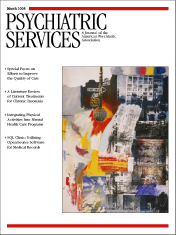Schizophrenia still remains an enigma and a big intellectual challenge in psychiatric research and clinical practice. From time to time, it may be useful to reexamine the current approach to a known issue. Schizophrenia: Challenging the Orthodox is an illustration of such a reexamination of our approach to schizophrenia. This small volume arose from the inaugural meeting of the European Foundation for Psychiatry at the Maudsley in London. The purpose of this conference was to "question many of the dogmas about the illness, and explore new and more productive ways of thinking about it."
The book consists of 23 chapters and is divided into seven sections: "Brain Imaging: Seeing Isn't Always Believing"; "Will Genetic Research Pay Off?"; "Epidemiology: Anyone Can Find an Environmental Risk Factor"; "The Prodrome and Early Intervention: More Than a Marketing Ploy?"; "Psychopharmacology and Psychology: Do the Two Words Ever Meet?"; "Alterations in Cognition: Can They be Trusted or Treated?"; and "Schizophrenia and Bipolar Disorder: The Same But Different?"
Most of the chapters discuss either new or old findings in a critical and unorthodox fashion—because the goal of this book is challenging the orthodox. Here I mention several interesting points. The neuroimaging section reviews the brain abnormalities in schizophrenia, but also the visualization of the cerebral alterations underlying hallucinations. The section on genetics discusses the important findings from the Iceland genetic study implicating neuregulin (1) as the first true susceptibility gene for schizophrenia. The section on epidemiology questions whether the environment can cause or contribute to schizophrenia. It also probes the possible risk and protective factors of schizophrenia—interestingly, smoking may reduce the risk of schizophrenia. Methamphetamine can induce psychosis that is almost identical to the positive syndrome, and cannabis abuse not only worsens schizophrenia but also can contribute to the onset of psychosis.
I found the discussion in the section devoted to early detection and intervention in schizophrenia the most interesting. Some argue that prediction of psychosis is necessary and possible and that individuals who have a long duration of untreated psychosis have a poorer outcome than those with a shorter delay in treatment. On the other hand, others argue that early intervention in schizophrenia is a waste of valuable resources, because we have very good treatments available and we should rather spend resources on increasing adherence among persons who are already ill.
The section on pharmacology and psychology reiterates the role of dopamine and other receptors in the etiology and treatment of schizophrenia. The section on cognition suggests that cognitive-behavioral therapy alone may prevent or delay progression to psychosis even without drug treatment. It also finds cognitive remediation better than cognitive-behavioral therapy. The last section discusses a bit lamely the similarities and differences between schizophrenia and bipolar disorder.
This intellectually stimulating book contains a wealth of critically examined information about schizophrenia. The brevity, straightforwardness, and clarity of the chapters are especially enjoyable features (23 chapters on 221 pages, including the index). I wholeheartedly recommend this book to anybody seriously interested in the newest thinking about schizophrenia.

